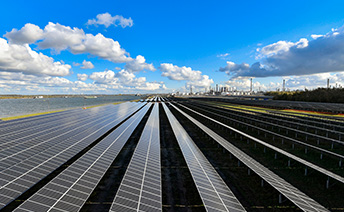Oil and Gas Climate Initiative (OGCI)
OGCI is a CEO-led organisation bringing together twelve of the largest oil and gas companies worldwide to lead the industry’s response to climate change.[1] OGCI member companies represent about 30% of global oil and gas production.[2] It aims to accelerate action towards a net-zero emissions future consistent with the Paris Agreement.[3] OGCI members set up OGCI Climate Investments (a separate entity) to create a US$1 billion-plus fund that invests in companies, technologies and projects that accelerate decarbonisation within energy, industry, built environments and transportation.[4]
Membership of board/executive committee: Shell is represented on the OGCI executive committee.
- 2022 assessment outcome: Aligned
- 2021 assessment outcome: Aligned
Summary
Shell benefits from its membership of OGCI, especially in relation to its work on methane and carbon capture, utilisation and storage (CCUS).
We particularly welcomed the launch of OGCI’s industry-wide Aiming for Zero Methane Initiative in 2022, and its work to help accelerate the deployment of CCUS in key countries.[5] [6] [7] [8]
We have found OGCI to be aligned with our climate and energy transition-related policy positions.
We will remain a member of OGCI. We will continue to engage the association on climate and energy transition topics. We will continue to track alignment between OGCI’s climate and energy transition-related positions and our own.
Further information
Click on the sections below to read more.
- OGCI has stated that it “supports the goals of the Paris Agreement, limiting global warming to well below 2°C and pursuing efforts to limit it to 1.5°C.”[9]
- OGCI has stated that it supports “the need for the world to move to a net zero carbon emission future, also called carbon neutrality.”[10]
- In its Progress Report 2022, OGCI stated “All 12 OGCI member companies are pursuing strategies that aim to achieve net zero GHG emissions (or carbon neutrality) by mid-century from operations under their control.”[11]
- OGCI states that “the most efficient climate policies and regulations are those that abate the highest volume of emissions for the lowest cost. For the majority of sources and sectors, the most effective means of reducing emissions is the application of an economic value (or price) to carbon-based emissions”.[12] [13] OGCI has stated support for Article 6 of the Paris Agreement.[14]
- OGCI has stated it is sharing energy efficiency best practice among OGCI members.[15] In 2022, it published a paper on decarbonisation pathways for the shipping industry, with a particular focus on energy efficiency and low-carbon fuels.[16]
- OGCI’s annual progress reports outline some of the actions taken by OGCI members on low-carbon hydrogen.[17] [18]
- OGCI has noted the role that green or blue hydrogen could play in heavy-duty transport.[19]
- OGCI’s position paper on Natural Climate Solutions (NCS) states its support for “policies, national strategies and initiatives that aim to scale up the use of high-quality nature-climate solutions as a complementary decarbonisations tool”.[20] It has also stated that “NCS [natural climate solutions] do not substitute the need to intrinsically decarbonize the energy sector, but NCS can contribute to greater ambition, as the world’s energy systems are transformed”; it also states that “OGCI member companies prioritize avoiding, reducing, reusing and recycling greenhouse gas (GHG) emissions and will continue to do so in addition to any removal notably through NCS activity.”[21]
- OGCI is a supporter of the Natural Climate Solutions Alliance (NCSA) and has stated support for NCSA’s draft principles.[22] OGCI has also stated support for the International Union for Conservation of Nature (IUCN) recommendations developed for nature-based solutions.[23]
- In 2022, OGCI and Ipieca published joint guidance for the oil and gas industry titled Natural climate solutions: high carbon stock ecosystems management.[24]
- OGCI’s position paper on CCUS states support for “a massive scale-up” of carbon capture, utilisation and storage (CCUS), and policy mechanisms that support it.[25] [26] OGCI’s KickStarter initiative is designed to facilitate large-scale commercial investment in CCUS and identify policy options to accelerate its deployment.[27]
- OGCI launched its CCUS Hub platform in 2022, which it states “aims to help political decision-makers, industrial emitters, carbon transport & storage operators and potential hub developers to set up their own CCUS hubs, learning from the experience of those already in advanced development”.[28]
- OGCI commissioned a report by the Roundtable on Climate Change and Sustainable Transition, HFW and Carbon Counts, to analyse “the potential for new mechanisms to incentivize the geological storage of carbon dioxide through international cooperation in the context of Article 6 of the Paris Agreement”.[29]
- OGCI commissioned and published a number of reports that focus on how to accelerate the deployment of CCUS in key countries.[30] [31] [32] [33]
- OGCI does not appear to have stated a position in relation to international ESG standards and benchmarks.
- OGCI’s strategy and principles include publishing “accurate, consistent and transparent data, backed by third-party review”.[34] OGCI provides its members with a reporting framework containing guidance on key indicators to report annually, so that OGCI can publish information about its progress against OGCI public commitments and declarations.[35]
No position
- OGCI has stated “we recognize the importance of low carbon electrification as an opportunity to reduce emissions from energy-intensive processes” and that “OGCI is drawing up an electrification roadmap for upstream and downstream oil and gas production.”[36]
- OGCI has stated that it is “committed to managing methane emissions from the oil and gas sector and supports the implementation of well-designed direct and indirect regulations, at the national and regional levels, tackling methane emissions reduction of new and existing sources”.[37] OGCI has stated support for a standardised monitoring, reporting and verification framework for methane emissions.[38]
- OGCI states that its member companies have the ambition of “eliminating nearly all methane emissions from their operations by 2030”.[39] In 2022, OGCI launched the Aiming for Zero Methane Emissions Initiative “to encourage the whole industry to eliminate its methane footprint by 2030”.[40] [41]
- OGCI is a supporting organisation of the Methane Guiding Principles.[42]
- OGCI encourages “governments to implement effective policies that reduce methane emissions, including absolute or intensity reduction targets, working through the Global Methane Alliance”.[43] OGCI works through the Global Methane Alliance to “finance the detection of methane emissions from the oil and gas industry” and to mitigate emissions.[44]
- OGCI has stated: “Putting a stop to routine flaring in the next few years requires an integrated focus on infrastructure, technology, processes, policies and regulations. OGCI is working on all these fronts to make Zero Routine Flaring by 2030 a reality.”[45] OGCI states that all its members have stated support for ending routine flaring by 2030.[46] [47]
- In 2022, OGCI launched the Aiming for Zero Methane Emissions Initiative, which includes a commitment to “put in place all reasonable means to avoid venting and flaring”.[48]
- In September 2022, OGCI, Methane Guiding Principles and the Global Gas Flaring Reduction Partnership launched the Methane Flaring Toolkit.[49] This is an online, publicly available platform providing “practical advice and information on the effective measurement and monitoring of methane emissions from gas flares in the oil and gas industry”.[50]
- In its 2020 report ‘The role of low carbon fuels in decarbonizing transport’, OGCI states that for “passenger vehicles and light commercial vans, electrification is already playing a role in reducing emissions, especially when powered by renewable energy. This trend will continue in parallel with the development of more efficient engines and transport fuels that have a far lower carbon footprint than those in the market today. These decarbonization pathways are expected to collectively lead to a considerable reduction in the CO2 emissions generated in road transport, even within the next decade. Policies intending to reduce emissions in this sector will need to consider local and regional culture and economics and the pace of adoption of technological innovation.”[51]
- In its 2020 report ‘The role of low carbon fuels in decarbonizing transport’, OGCI states that for decarbonising long-haul trucking, there are currently “few viable alternatives to liquid fuels” but that it is working “with other leaders on additional decarbonization initiatives […] focusing on hydrogen”.[52]
- OGCI has stated support for heavy industry decarbonisation, principally through the use of CCUS. Its 2021 progress report states that “CCUS is a crucial enabler for the energy transition and can help emitting companies – and entire regions – to decarbonize cost-effectively, maintaining and creating jobs.” [53]
- In 2022, OGCI launched the CCUS Hub, a platform to support policymakers, hub developers and industrial emitters, partnering with organisations including the Clean Energy Ministerial CCUS Initiative, and offering webinars and other resources.[54]
- In its 2020 report ‘The role of low carbon fuels in decarbonizing transport’, OGCI states that “finding long-term decarbonization pathways for long-haul aviation remains crucial.”[55]
- In its 2020 report ‘The role of low carbon fuels in decarbonizing transport’, OGCI states that for international shipping, there are currently “few viable alternatives to liquid fuels” and that it is working with “with other leaders on additional decarbonization initiatives” focusing on “mobile carbon capture in shipping”.[56]
- In February 2022, OGCI published a study with Concawe, ‘Technological, Operational and Energy Pathways for Maritime Transport to Reduce Emissions Towards 2050’, which calls for “a large-scale deployment of new technologies and/or alternative low-carbon fuels across international shipping to help achieve the IMO’s target of reducing total greenhouse gas emissions by at least 50% by 2050 relative to 2008 levels.”[57]
[1] https://www.ogci.com/about-us/
[2] https://www.ogci.com/about-us/
[3] https://www.ogci.com/about-us/
[4] https://www.ogci.com/about-us/
[5] https://aimingforzero.ogci.com/
[6] https://www.ogci.com/white-paper-study-shows-that-ccus-deployment-in-gcc-countries-could-unlock-significant-economic-potential-in-the-region/
[7] https://www.ogci.com/new-ogci-report-on-ccus-in-china/
[8] https://www.ogci.com/new-ogci-report-on-ccus-in-saudi-arabia/
[9] https://www.ogci.com/ogci-full-strategy/
[10] https://www.ogci.com/ogci-full-strategy/
[11] https://info.ogci.com/hubfs/OGCI_ProgressReport_2022.pdf
[12] https://www.ogci.com/ogci-position-papers/#:~:text=Where%20a%20carbon%20price%20is%20not%20possible%2C%20practicable,as%20tax%20credits%20and%20subsidies%20for%20emerging%20technologies
[13] http://www.ogci.com/download/ogci-position-paper-value-carbon/
[14] https://www.ogci.com/download/ogci-position-papers-article-6/
[15] http://www.ogci.com/download/ogci-progress-report-2021/
[16] https://info.ogci.com/hubfs/OGCI_ProgressReport_2022.pdf
[17] http://www.ogci.com/ogci-releases-its-2021-progress-report/
[18] https://info.ogci.com/hubfs/OGCI_ProgressReport_2022.pdf
[19] https://www.ogci.com/wp-content/uploads/2020/07/OGCI-Low-carbon-fuels-report-July2020.pdf
[20] https://www.ogci.com/download/ogci-position-paper-ncs/
[21] https://www.ogci.com/download/ogci-position-paper-ncs/
[22] https://www.ogci.com/download/ogci-position-paper-ncs/
[23] https://www.ogci.com/download/ogci-position-paper-ncs/
[24] https://www.ipieca.org/resources/natural-climate-solutions-high-carbon-stock-ecosystems-management
[25] http://www.ogci.com/download/ogci-position-paper-ccus/
[26] https://info.ogci.com/hubfs/OGCI_ProgressReport_2022.pdf
[27] http://www.ogci.com/action-and-engagement/removing-carbon-dioxide-ccus/our-kickstarter-hubs/
[28] http://ccushub.ogci.com/
[29] https://www.ogci.com/study-on-carbon-storage-units-and-obligations-under-article-6-of-the-paris-agreement/
[30] https://aimingforzero.ogci.com/
[31] https://www.ogci.com/white-paper-study-shows-that-ccus-deployment-in-gcc-countries-could-unlock-significant-economic-potential-in-the-region/
[32] https://www.ogci.com/new-ogci-report-on-ccus-in-china/
[33] https://www.ogci.com/new-ogci-report-on-ccus-in-saudi-arabia/
[34] https://www.ogci.com/strategy/
[35] https://www.ogci.com/knowledge-base/ogci-performance-data/
[36] http://www.ogci.com/ogci-releases-its-2021-progress-report/
[37] http://www.ogci.com/download/ogci-position-paper-methane/
[38] http://www.ogci.com/download/ogci-position-paper-methane/
[39] https://info.ogci.com/hubfs/OGCI_ProgressReport_2022.pdf
[40] http://www.ogci.com/action-and-engagement/reducing-methane-emissions/
[41] https://aimingforzero.ogci.com/
[42] https://methaneguidingprinciples.org/about/
[43] http://www.ogci.com/action-and-engagement/reducing-methane-emissions/
[44] http://www.ogci.com/action-and-engagement/reducing-methane-emissions/
[45] https://www.ogci.com/talking-transition-putting-a-stop-to-flaring/
[46] http://www.ogci.com/ogci-releases-its-2021-progress-report/
[47] https://www.ogci.com/talking-transition-putting-a-stop-to-flaring/
[48] https://aimingforzero.ogci.com/wp-content/uploads/2022/07/Aiming-for-Zero-Text-of-the-Initiative.pdf
[49] https://flaringmethanetoolkit.com/
[50] https://flaringmethanetoolkit.com/
[51] https://www.ogci.com/wp-content/uploads/2020/07/OGCI-Low-carbon-fuels-report-July2020.pdf
[52] https://www.ogci.com/wp-content/uploads/2020/07/OGCI-Low-carbon-fuels-report-July2020.pdf
[53] https://www.ogci.com/ogci-releases-its-2021-progress-report/
[54] https://info.ogci.com/hubfs/OGCI_ProgressReport_2022.pdf
[55] https://www.ogci.com/wp-content/uploads/2020/07/OGCI-Low-carbon-fuels-report-July2020.pdf
[56] https://www.ogci.com/wp-content/uploads/2020/07/OGCI-Low-carbon-fuels-report-July2020.pdf
[57] http://www.ogci.com/wp-content/uploads/2022/02/OGCI_Concawe_Maritime_Decarbonisation_Final_Report_Issue_6C.pdf










